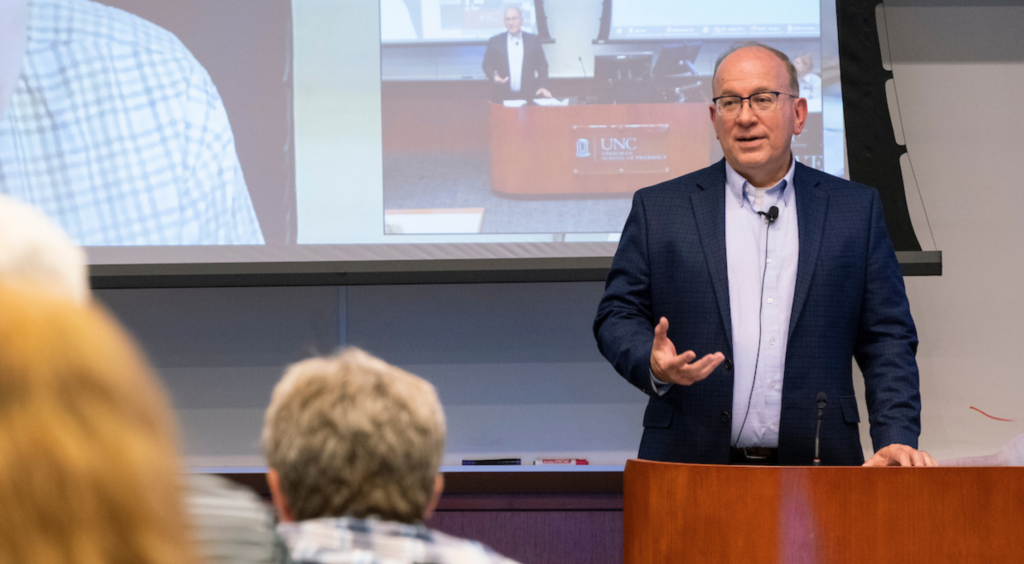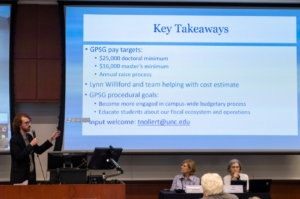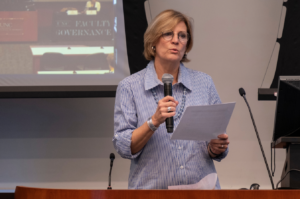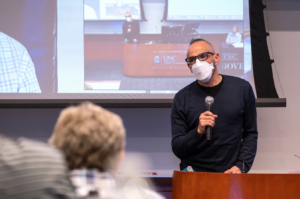Higher stipends for graduate students announced at Faculty Council
Calling it a “miracle of cooperation,” Provost Chris Clemens said the proposed one-time increase would be the biggest in University history.

In good news for graduate students, Provost Chris Clemens announced his hope for the future implementation of “the biggest one-time increase to the graduate student minimum stipend in the history of this institution” in his remarks at the Nov. 4 Faculty Council meeting.
“Since becoming provost, I have witnessed two miracles of cooperation, first when the Board of Trustees embraced the Faculty Council resolution on free expression, and today when the Faculty Council will join with the board, the chancellor and the provost in calling for higher graduate student stipends,” Clemens said.
The provost did not specify a figure or date of implementation, which would be in addition to a $1,000 increase to the minimum stipend that has already been approved. “We will not get all the way to our shared goal in one jump, but it is my hope we will soon be able to announce a big step in the right direction,” he said.

In his presentation, Theodore Nollert, president of the Graduate and Professional School Government, advocated for pay targets of $16,000 for master’s student employees and $25,000 for doctoral student employees. The council unanimously passed a resolution to support an increase in minimum stipends and a plan to provide regular pay increases for graduate students.
“The Faculty Council affirms that graduate students are essential to the teaching and research missions of UNC-Chapel Hill and that attracting and retaining outstanding graduate students benefits the whole University community and the state it serves,” the resolution said.
Carolina at the Supreme Court
Both Chancellor Kevin M. Guskiewicz and Faculty Chair Mimi Chapman focused on Carolina’s first appearance at the U.S. Supreme Court on Oct. 31 to defend its holistic admissions policy, which considers race as one of many factors.
“You could tell the justices understood the importance of the moment and asked probing questions about both the Carolina and Harvard cases. I saw their thoughtful deliberation about these issues,” said Guskiewicz, speaking via recorded video at the hybrid meeting, which met online and in person at Kerr Hall.
“I believe we presented a very strong case,” he continued. “Diversity, in all its dimensions on campus, is essential for educating American citizens.”

The case put forward by the University “made me very proud to be a Tar Heel,” said Chapman, who called the University’s defense team “we happy few,” quoting King Henry V’s St. Crispin’s Day speech after the Battle of Agincourt. “They went straight into the breach,” she said of the members of University Counsel whom she invited to address the council. “This was a most honorable fight, and we should be proud to be part of an institution that stood up on behalf of so many other colleges and universities across the country.”
Faculty applauded the three University attorneys: Charles Marshall, vice chancellor and general counsel, and Steve Keadey and Kara Simmons, associate vice chancellors and senior university counsels.
Applied Professional Studies degree
Laura Kuizin, director of the new Master of Applied Professional Studies program in The Graduate School, spoke to faculty about this extremely flexible interdisciplinary degree designed to “improve the workforce in the state and region.”
The program will launch in spring 2023, with a mix of in-person and online courses that students may enroll in full-time or part-time. They may complete the 30-hour degree in as little as 18 months or in up to five years.
The degree is built on a base of professional studies and skills (leadership, management, communication), but the student selects 15 elective credits based on their own academic and professional interests. A capstone experience completes the degree.
“I’m really hoping that we’ll see a lot of our UNC employees on campus take advantage of the tuition waiver program,” Kuizin said.
New RESPTC center
School of Medicine faculty shared information about the new emerging pathogens center that will open in Chapel Hill as a part of a three-site regional expansion to improve the nation’s response to public health emergencies.

Drs. William Fischer and David Wohl, both members of the UNC Institute for Global Health and Infectious Diseases, will lead the new Regional Emerging Special Pathogen Treatment Center, established through a $3-million federal grant. They fielded questions about the safety of the center, emphasizing how state and local public health departments have been fully involved and supportive in the process.
“This is not going to be a situation at all, feasibly, where an infection could come into our hospital, escape through the ventilation system and infect Chapel Hill — ‘the virus that ate Chapel Hill’ — that’s not going to happen,” Wohl said. “We are a global leader in infection prevention and control and teach others how to do that all the time.”
Leadership term changes
In a continuation of a discussion begun at the Oct. 7 meeting, the council approved changes in the terms of its leadership to improve continuity and encourage more faculty members to run for office:
- Chair will serve two years instead of three, with a one-year term as chair-elect and member of Faculty Executive Committee.
- Immediate past chair will become a member of the Advisory Committee.
- Secretary will serve four years instead of five, with a two-term limit.
Because the change involves a revision of the Faculty Code, members of the general faculty will also need to vote on the resolution before it goes into effect. If fully approved, the changes will go into effect for the next election for chair in spring 2025 and at the end of the current secretary’s term.
Watch a recording of the Nov. 4 Faculty Council meeting online.
– published on November 8, 2022 (source)
